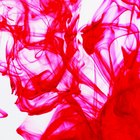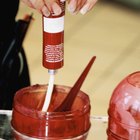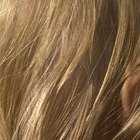There are many hair color products on the market today, each offering different results. While some chemical hair colors are made with natural extracts, henna is a hair color that has 100% natural ingredients.
Composition of Permanent Hair Color
Hair bleaches and dyes consist of oxidizing agents such as potassium and ammonium persulphates, or hydrogen peroxide, ammonia as an alkalizing agent, and a color that deposits once the bleaching agent has removed the natural hair color.
Compositon of Henna
Henna powder is the dried and ground leaves of the Lawsonia Inermis plant, which releases a vibrant red when mixed with a natural acid. Natural acids that are used to mix henna include lemon juice and vinegar.
Permanent Hair Color Results
Permanent hair color can create many natural colors or highlights on all hair types. Accurate color result charts are often printed on the boxes of at-home color. The hair color does not wash out but may fade slightly. New growth will need to be recolored every 4-6 weeks.
Henna Color Results
Henna results will depend on your hair and the length of exposure. The longer henna sits, the deeper the red. The lighter your natural hair, the more vibrant the red will be, though henna should not be used on gray hair. Henna colors can be tweaked with natural additives, such as coffee for a burgundy effect. Henna is considered permanent, though new hair growth will also need to be colored regularly.
Choosing Your Product
For a truly natural look, you may gravitate toward henna, however there are many warnings not to use henna on hair that has been previously chemically processed, as this can cause severe damage. Using permanent hair color on hair that has already been dyed or permed is common, though slightly damaging.
Related Articles

How to Lighten Synthetic Wigs

Can I Dye My Hair After Bleaching It?

How Long Should a Hair Toner Be Left on ...

How to Get Peroxide Out of Hair

Ways to Prevent Damage During Hair ...

What Is Clear Matrix Color Sync?

How to Keep Burgundy Hair Vibrant

How to Make Purple Hair Dye From Kool ...

How to Darken Red Hair Dye

What Is Dye Made From?

How Often Can You Color Your Hair at ...

How to Use a 40% Developer With Toner

How to Use a Toner When Coloring Hair

How to Keep Temporary Dye From Fading

Difference Between Hair Glaze & Hair ...

How to Get Rid of Bronze Hair Color

Difference Between Sebastian ...

Highlights Vs. Lowlights

Can I Use Henna in My Hair Every Week?

How Are Highlights Done in a Salon?
References
Writer Bio
Jennifer Van Leigh began writing short pieces in 2007. With over five years in the hair industry, Van Leigh has contributed articles at Atlanta Salon & Spa and is certified as an extensions stylist. She studied scriptwriting and creative nonfiction in Gallery 37, a Chicago youth arts program.